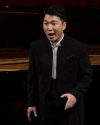Tae Hwan Yun. Matthias Alteheld

Heinrich Heine is still one of the most frequently set poets to music today. Tenor Tae Hwan Yun, winner of the Heidelberger Frühling "Das Lied" competition in 2023, gets to the bottom of this possibly ambivalent fascination with a pure Heine program that he thinks chronologically backwards.
A selection from the Heine cycle by Wilhelm Killmayer forms the prelude. The Munich composer, who died in 2017, is considered a stylistic outsider. Although the influences of Igor Stravinsky and his teacher Carl Orff are noticeable, so too is his involvement with Robert Schumann. His "Dichterliebe" forms the weighty finale of the evening. Schumann's settings of Heine have often been heard as productive misunderstandings, as Dietrich Fischer-Dieskau writes in his Schumann book: "But he [Schumann] often put the whole depth of his feeling into lightweight texts and in this way gave them a character that Heine might have smiled at". The cliché that Heine's poetry was ironic and that Schumann either misunderstood Heine or simply did not want to be ironic has now outlived its usefulness. Especially as Schumann's "Dichterliebe" by no means ignores Heine's irony. For example, when he parries Heine's mockery in "Ein Jüngling liebt ein Mädchen" with the cheeky sound of a balladeer.
At the center of the evening is one of the early song "bouquets" that Brahms preferred to large song cycles: the Six Songs op. 3 set two poems by Joseph von Eichendorff as well as works by second-tier poets such as Robert Reinick and Friedrich von Bodenstedt, who are almost forgotten today.
Concert without intermission
 Zurück zur Website
Zurück zur Website

